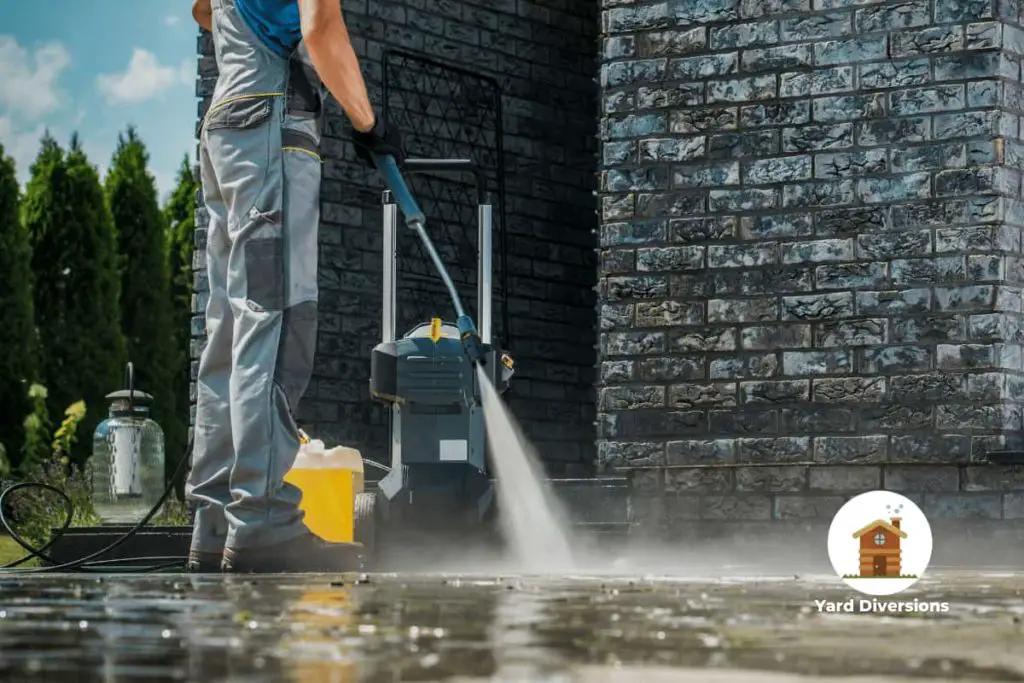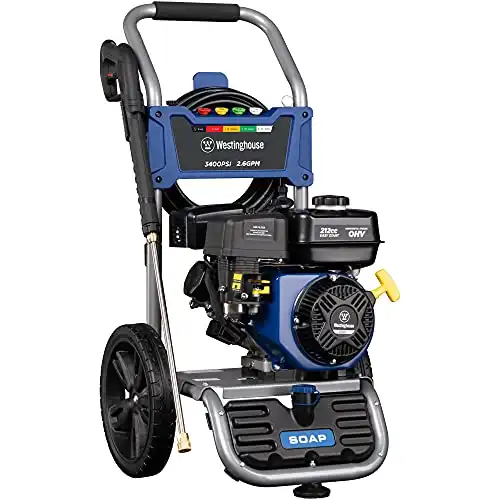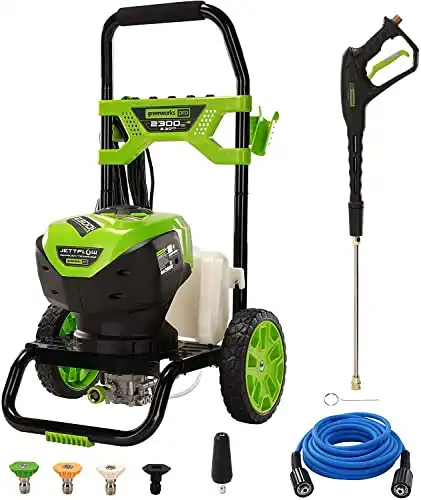Cleaning the exterior of your home or car can be a daunting task, especially when faced with tough dirt and stains. Luckily, pressure washers offer an efficient solution for deep cleaning outdoor surfaces.
However, choosing between a gas pressure washer versus electric can be overwhelming. Both models have pros and cons that need to be considered before purchasing one.
In this powerful cleaning showdown, we’ll compare gas pressure washers versus electric models to help you make an informed decision based on your needs and preferences. Get ready to power clean like a pro!

Choosing The Best For Your Needs: Gas Pressure Washer Versus Electric
When it comes to pressure washers, there are two main types to consider: gas-powered and electric. Both have their own advantages and disadvantages, so deciding which one is right for your cleaning needs requires some careful consideration.
Gas pressure washers are typically more powerful than electric models, making them the better choice for tough grime and heavy-duty usage. They’re also more durable, with high-quality replaceable parts and a longer lifespan. Additionally, they have more accessories available for a variety of cleaning jobs.
However, gas pressure washers require more user skill due to their high PSI and GPM. They’re also louder and emit emissions that can be harmful to the environment.
Gas-powered models are usually more expensive as well, although they offer greater versatility since they can be used anywhere outdoors without cord limitations.
Electric pressure washers may not be as powerful as their gas counterparts but they’re easier to start up and use in enclosed spaces thanks to their lower noise levels.
Electric models require less maintenance compared to gas ones too because they don’t have an engine that needs upkeep or fuel changes over time.
Ultimately, when choosing between these two options you’ll want to consider what kind of tasks you’ll be using your machine for most often – if you need something that’s great for heavy-duty work like commercial cleaning around large areas or tough surfaces then go with a gas-powered model; otherwise an electric option might suffice at a lower price range while still being able handle many cleaning tasks enough!
Check out our pressure washer buyer guide for more details on pressure washers.
Gas Pressure Washer
Gas-powered pressure washers are considered the heavy-duty option when it comes to cleaning.
They typically have a higher PSI range than electric models, making them great for tackling difficult tasks like removing stubborn stains and cleaning large areas. The Westinghouse WPX3400, shown below, is a popular gas-powered model that many people choose for its power and durability.
One major advantage of using a gas pressure washer is that you don’t need an outlet nearby, as they are cordless and portable.
This makes them ideal for outdoor use around your home or even on job sites where there may not be easy access to electricity.
Additionally, gas-powered pressure washers can handle more commercial tasks since they produce more water volume per minute than electric units.
However, with this extra power comes some drawbacks. Gas pressure washers can be difficult to handle due to their higher motor power and require more maintenance than electric models.
They also tend to cost more initially, but offer better professional results with high-quality replaceable parts that last longer than their electric counterparts.
If you’re considering a gas pressure washer, it’s important to consider factors such as engine design, wheels for easier maneuverability and storage options when not in use.
You’ll also want to pay attention to the nozzle spray pattern since some surfaces require different spray angles or force levels.
Ultimately, the choice between an electric or gas-powered pressure washer comes down to your needs and budget.
If you’re looking for a powerful machine that can handle heavy-duty tasks without being tethered by an extension cord then a gas model will likely be your best option!
Advantages
When it comes to pressure washers, both gas and electric models have their own set of advantages. Electric pressure washers are usually more budget-friendly and require less maintenance than their gas-powered counterparts.
They’re also typically more lightweight and portable, making them a great option for smaller cleaning tasks or for use around the house.
On the other hand, gas-powered pressure washers are often more powerful than electric models, with higher PSI and GPM ratings that make them better suited for heavy-duty commercial tasks or larger surface areas. They’re also generally built with more durable materials like aluminum and steel construction.
Ultimately, when choosing between a gas or electric pressure washer you’ll need to consider your specific needs. If you’re looking for a machine that’s easy to use around the house for occasional cleaning tasks, an electric model like the Greenworks PRO 2300 below is probably your best bet.
However, if you need something with enough power to tackle large areas like driveways or decks on a regular basis, then a gas-powered model might be worth the higher price tag and maintenance costs.
No matter which type of unit you choose though, both have their own unique benefits that should be considered based on your particular situation.
Disadvantages
While gas pressure washers are powerful and great for heavy-duty tasks, they do have some drawbacks that you should consider before making a purchase. Firstly, they can be difficult to handle due to their weight and lack of portability. Most models come with wheels, but this still makes them less maneuverable than electric pressure washers.
Another disadvantage of gas-powered pressure washers is the higher maintenance required for the motor and pump. This includes changing the oil and gasoline filter regularly, as well as replacing spark plugs when needed.
Additionally, these machines emit carbon monoxide, which makes them unsafe for use in enclosed spaces even with doors open.
Lastly, gas pressure washers can cause damage to delicate surfaces such as vehicle paintwork due to their high-pressure output.
If you’re looking for an option that’s better suited for light jobs such as cleaning decks or cars without causing any damage then an electric pressure washer would be your ideal choice.
Overall, while gas-powered models offer more power and durability than electric units, they also come at a higher price range with additional maintenance costs attached.
It’s important to consider your specific needs before making a decision between the two options available in terms of power output and ease-of-use features like cordless or portable designs from brands like Greenworks that produce enough spray force without using detergent or induction motors making it easier on people who aren’t used to handling larger machines weighing over 100 pounds especially if you need to clean large areas without an outlet nearby which would require an extension cord too!
Electric Pressure Washer
If you’re looking for a pressure washer that’s easy to use, requires less maintenance, and is eco-friendly, then an electric pressure washer might be the right choice for you.
These machines, like the Greenworks PRO 2300 shown below, typically run at 1,500 to 3,000 psi with 1.5 to 2.5 GPM and are good for both indoor and outdoor use.
One of the advantages of electric pressure washers is that they produce no harmful emissions, making them a better option for people who are concerned about the environment. They are also typically lighter in weight than their gas-powered counterparts, making them easier to handle and maneuver around your home or yard.
When it comes to price range, electric pressure washers are usually cheaper than gas pressure washers with an average price of $100 to $400. And while they may not have as much power as gas models, they can still handle most light-duty cleaning tasks around the house.
Overall, if you’re looking for a durable and portable machine that would make cleaning areas around your home easier without producing any harmful emissions or requiring too much maintenance then an electric pressure washer is a great choice!
Check out our guide to the best pressure washers on Amazon, get to washing as soon as tomorrow!
Advantages
When choosing between a gas pressure washer and an electric pressure washer, it’s important to consider the advantages of each.
Gas-powered models are typically more powerful than electric washers, making them a great choice for heavy-duty cleaning tasks around large areas like decks, patios, and driveways.
They also tend to be more durable and have a longer lifespan compared to their electric counterparts.
Electric pressure washers have their own set of advantages as well. They are generally easier to use and require less maintenance since there is no engine that needs regular upkeep.
Electric washers are also quieter than gas models and do not emit harmful emissions into the environment, making them safe for indoor use if needed.
In terms of cost-effectiveness, electric pressure washers usually come with a lower price range compared to gas-powered units which can be quite expensive.
This makes them an attractive option if you’re on a tight budget or only need a machine for occasional light cleaning tasks around the home.
Ultimately, when deciding which type of pressure washer is right for you it comes down to your specific needs and preferences.
Consider factors such as power and portability requirements along with environmental impact before making your final decision.
What Should I Consider When Choosing?
When it comes to choosing between a gas pressure washer and an electric pressure washer, there are several factors you should consider. Here are some key points to keep in mind:
Power & Portability: Gas-powered models usually offer higher water pressure and flow rate than electric models, making them better suited for heavy-duty cleaning tasks.
However, they can be difficult to handle since they are heavier and require more maintenance due to the engine.
On the other hand, electric models are lighter and more portable but have limitations when it comes to power.
Cost & Maintenance: The initial cost of an electric pressure washer is generally lower than a gas model. Electric washers also require less maintenance since they don’t have an engine that needs oil changes or spark plug replacements.
However, if your cleaning tasks require higher PSI or GPM levels, then a gas-powered unit may be a better investment in the long run.
Environment & Fuel Consumption: Gas-powered washers produce emissions that contribute to air pollution and noise pollution as well. They also consume larger amounts of fuel which can add up over time.
Electric-powered units do not produce any emissions making them eco-friendly with low environmental impact.
Detergent Usage: Some machines come with built-in tanks for detergent while others may need external bottles hooked up through suction tubes or hoses for proper mixing at the nozzle tip.
Ultimately, your choice will depend on your specific needs such as cleaning tasks around your home or business premises, budget constraints, etc., so ensure you make the right decision by considering these factors before purchasing a pressure washer that suits all of your needs!
Cost & Maintenance
When it comes to cost, electric pressure washers are definitely the more budget-friendly option. They typically fall in the range of $90 to $180, while gas models can cost between $200 and $500. Gas-powered units are generally more expensive due to their high-powered motor and larger size.
In terms of maintenance, electric pressure washers are much easier to maintain than their gas-powered counterparts.While gas models have combustion engines that require frequent oil changes and filter replacements, electric models only require simple cleaning of the nozzle, hose, and spray gun.
Additionally, since they don’t run on fuel or oil, there are fewer parts that can become damaged or require replacement.
However, it’s important to consider your specific cleaning needs before making a choice based solely on cost and maintenance. If you have large areas or heavy-duty tasks that need powerful cleaning performance then a gas pressure washer may be a better choice as they produce higher water pressure than an electric one which makes them great for commercial jobs such as removing graffiti from walls.
Ultimately your decision will come down what tasks you plan on using your machine for but if you’re someone who would like a durable yet affordable option with lower maintenance costs then an Electric Pressure Washer such as Ryobi’s RY142300 model might be right up your alley!
Next up we’ll take a look at Power & Portability!
Power & Portability
When it comes to power and portability, gas pressure washers have the upper hand. With higher PSI and GPM ratings, they can handle tougher cleaning jobs and are usually better at cleaning surfaces like concrete and tarmac. They also come with specific scrubbers for these surfaces, underlining their power advantage.
However, electric pressure washers have their own advantages when it comes to portability. They are smaller and lighter than gas-powered models, making them easier to move around and store. Some models even have wheels for added convenience.
Another factor to consider is the power source. Electric pressure washers need to be plugged into an outlet, so their range is limited by the length of the cord or extension cord used. Gas pressure washers can be used virtually anywhere outdoors without pesky extension cords getting in your way.
Overall, if you’re looking for a heavy-duty machine that can handle commercial tasks or large areas of land, then a gas-powered model may be the right choice for you despite its high costs and difficult maintenance requirements.
However, if you want something portable that’s easy enough for people of all ages to use around your home without producing too much noise or requiring any special maintenance considerations – then an electric model would work great!
Environment & Fuel Consumption
When it comes to the environment and fuel consumption, electric pressure washers are the clear winner. They produce no emissions and require no gasoline to operate, making them an eco-friendly choice for cleaning tasks.
Gas pressure washers, on the other hand, produce harmful emissions and use gasoline as their fuel source. This can have negative impacts on the environment, especially if used frequently or in areas with poor air quality.
In addition to their environmental impact, gas pressure washers also require more maintenance than electric models. The engine needs regular oil changes and tune-ups to keep running smoothly. This not only adds to the cost of operating a gas washer but also increases its overall carbon footprint.
Overall, if you’re concerned about your environmental impact or want a machine that’s easier to maintain and operate over time, an electric pressure washer is likely your best choice. While there may be some cost differences between models upfront, the long-term sustainability benefits make it worth considering an investment in an electric model.
What are the advantages and disadvantages of using a gas pressure washer for cleaning compared to an electric pressure washer?
When considering pressure washer buying tips, it’s important to weigh the advantages and disadvantages of gas vs. electric models. Gas pressure washers offer more power and portability, but they can be louder and require more maintenance. Electric washers are quieter and easier to maintain, but lack the same power.
Conclusion
When it comes to choosing between a gas-pressure washer and an electric one, there are several factors to consider. Gas-powered washers are more powerful and better for heavy-duty tasks, but they also come with higher costs and maintenance requirements. Electric washers are more affordable and easy to use, but may not be enough for difficult cleaning jobs.
Ultimately, the right choice will depend on your needs. If you have large areas to clean or need a machine that can handle commercial tasks, a gas-powered model like the Ryobi RY142300 may be a great option. On the other hand, if you’re looking for something portable, cordless, and easy to store without requiring fuel or engine maintenance – then electric pressure washers would be perfect.
Consider factors such as power, portability, cost & maintenance as well as environmental impact when making your decision. Whichever type of washer you choose; make sure it is suited for the surfaces you will typically use it on – whether that’s concrete driveways or cars with sensitive paint finishes.
In summary: Both models have their pros and cons so it’s important that you pick the model that fits your budget as well as suits your cleaning requirements in terms of usage area around your home/office etc., level of power needed per task at hand (heavy vs light), design features like wheels, handle, nozzle, detergent storage options available on both machines among others should all figure into any purchasing decision made by people who want only quality results from high-performing equipment!



